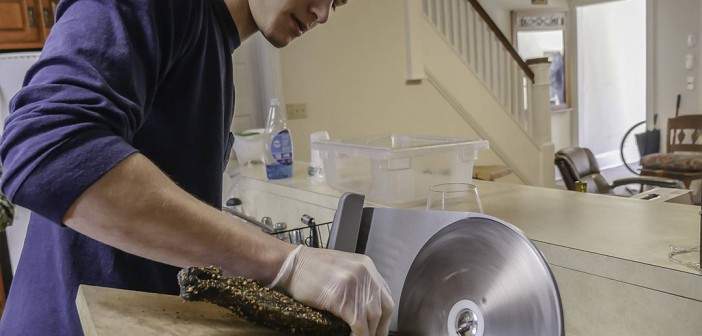As Pantelis Takos, ’16, watched his longtime friend Daniel Levy, ’16, make South African beef jerky, or biltong, he said he could make it, too. Levy told Takos said it had taken him over a year to get to where he is, and he is still learning new things every day.
Along with being a full-time Lehigh student, Levy manages his own business, Lehigh Biltong. Growing up in England until the age of 10 or 11, he always ate biltong.
“I couldn’t find it when I came (to America),” Levy said. “When I did, it was expensive or took a long time to get.”
Levy got the idea of making his own biltong during February of last year, and started his business a month or two later. He said he likes how in running a business, there is a goal and a physical final product for the work he does.
“It’s cool because you do everything in small amounts,” Levy said. “You almost have to be an expert in every field.”
Sean Purcell, ‘16, is one of Levy’s friends. He said, initially, Levy would have Purcell and his other friends and housemates try his biltong. Takos said they were skeptical at first if he could actually run a business.
“I thought it was a joke and that he would give up,” Purcell said. He said now he takes it seriously.
Levy said one of the reasons he started the business was because he needed money fast, but he learned that creating a successful business does not come instantly. He said he was actually spending more money than he was making, so he would have to wait for people to buy first batch before he could start the next.
“You expect to get a product out there and everyone to buy it, but you have to push for it,” he said.
Levy said making each batch of biltong exactly right was difficult at first. He said it took him about four to five weeks to get it right. He learned how to create biltong by researching online and asking his South African grandparents.
“Once you know how to make biltong, it’s fairly simple and easy to do,” Levy said.
Levy said one of the most valuable things he has learned at Lehigh is the importance of networking. One professor introduced him to a recent graduate who had a similar snack product business, who helped him learn about the logistics and packaging necessarily for this type of work.
Although Levy enjoys his company, he said balancing schoolwork and a business is difficult.
“It’s pretty tough,” Levy said. “I usually wake up early to get stuff done. I also get rid of stuff from my schedule that isn’t important, like watching TV.”
Purcell said he was able to see the Lehigh Biltong business grow from the start. He said sometimes Levy even prioritizes Lehigh Biltong over schoolwork.
Takos said Levy is constantly changing his recipes, changing packaging and talking to customers to seeing what they prefer.
Levy runs the business himself, but his friends help out by spreading the word. Takos said if a large shipment comes in, they will help with some tasks.
“It’s impressive to see you can build something from the ground up,” Purcell said.
Takos believes one of the most difficult parts for Levy’s business is getting people to buy something, as it is different from many products sold in the U.S.
“People are stuck in their ways,” Takos said. “It is hard to convince them that there is something better out there.”
The Goose in South Side is the only physical shop that carries Lehigh Biltong, but Levy said there is potential for some online stores to pick up on it. Most of his sales are from his website. When talking to stores, some things he asks about is feedback on his biltong and what considerations it needs to meet to be sold in the store, Levy wrote in an email.
Levy said he thinks, one day, Lehigh Biltong can be a more-developed venture.
“I’m getting to the point where if I did want to, I could make it a full-time business,” Levy said. “I could continue it with a job as well.”






Comment policy
Comments posted to The Brown and White website are reviewed by a moderator before being approved. Incendiary speech or harassing language, including comments targeted at individuals, may be deemed unacceptable and not published. Spam and other soliciting will also be declined.
The Brown and White also reserves the right to not publish entirely anonymous comments.
1 Comment
what did you need legally to sell the biltong?